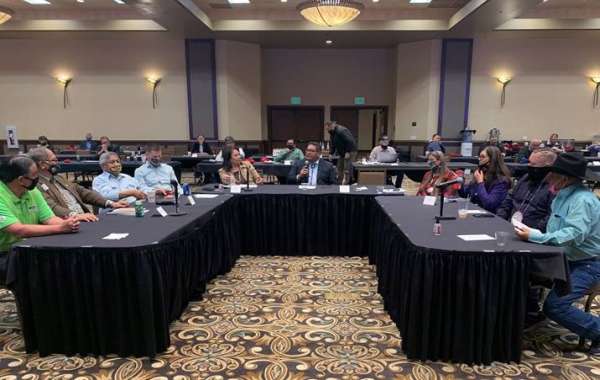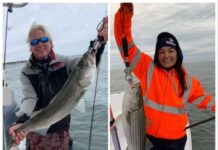Nez Perce Tribe Press Release
MISSION, OREGON – This week, representatives from 12 different Northwest Tribes spent two days discussing advancing a salmon and energy proposal from Rep. Mike Simpson (R-ID) that could make an unprecedented infrastructure investment in the Pacific Northwest to save imperiled salmon runs, protect inland agriculture industries, and transform the region’s energy supply for a renewable future.
Beyond the bold salmon and river restoration actions throughout the Columbia River Basin, the Simpson proposal (available at https://simpson.house.gov/salmon/) could protect salmon, water, agriculture, transportation and energy needs by:
- Investing nearly $5 billion in new transportation infrastructure to transport inland products like wheat to market;
- Investing over $14 billion in new energy infrastructure; including,
- $2 billion for Northwest grid resiliency/optimization;
- $1.25 billion for energy storage;
- $10 billion in replacement energy for the lower Snake River dams;
- Providing Snake/Columbia River communities with over $1.5 billion for economic development;
- Placing fish restoration under the direction of tribes and states;
- Investing in restoring the lower Snake River by breaching the four lower Snake River dams;
- Investing in restoring non-ESA listed fish above blocked areas;
- Allocating over $5 billion in other salmon conservation actions throughout the Basin; and
- Providing legal certainty on Columbia River dams for 35 years.
The tribes coalesced around the following set of “common ground” principles intended to continue and expand their dialogue with agricultural and energy interests:
- The true wealth of our region begins with the health of our rivers, fish and the ecosystem they support, which is our culture, history, and future;
- Agriculture is an important part of our region’s economy;
- Affordable and reliable power is important to regional families and business – tribal and non-tribal;
- Providing legal certainty for the vast majority of federal dams in the Columbia/Snake River basins is a necessary element of a lasting solution;
- A significant federal infrastructure investment in alternative energy and transportation provides a unique opportunity to restore salmon while keeping power affordable and maintaining agricultural commerce;
- A comprehensive legislative solution is preferable to all other avenues and is urgently needed.
- The time for action is now. The Columbia Basin cannot become another Klamath Basin crisis.
QUOTES FROM TRIBAL LEADERS:
- Kat Brigham (Chair, Board of Trustees, Confederated Tribes of the Umatilla Indian Reservation) said: “Rep. Simpson’s proposal is a once-in-a-lifetime opportunity to set aside past differences and chart a new course for the survival of the Columbia River Basin – including salmon, farmers and many others.”
- Shelly Fyant (Chairwoman, Tribal Council, Confederated Salish & Kootenai Tribes) said: “The Confederated Salish & Kootenai Tribes (“CSKT”) holds the water of our region as sacred life blood of our people. Water sustains us and the resources that we rely on for survival. As we utilize the water the creator provided for us all we must do it from these perspectives. CSKT is an owner of a portion of the Columbia Basin Hydropower system providing flood control and power to the region and sees clearly that the comprehensive proposal put forth by Rep Simpson is the most viable path for restoration of Columbia Basin Resources. We say this from not only a provider of energy but also as a Bonneville Power preference customer bringing energy from the Columbia Basin Hydropower system to our people. We encourage the rest of the NW delegation to join with Representative Simpson to complete this comprehensive plan and commit the resources to implement it.”
- Rodney Cawston (Chairman, Colville Business Council, Confederated Tribes of the Colville Reservation) stated: “On behalf of the Confederated Tribes of the Colville Reservation, I appreciate Congressman Simpson’s comprehensive approach in his Columbia River proposal, and its inclusion of the agricultural and power production interests, and the opportunity for the Tribes to provide their comments. Food and agriculture are needed to feed the world. Hydropower is a cheap and reliable form of renewable energy. Yet, hydropower impacts salmon spawning beds, causes low water levels, and warmer water temperatures, all of which devastate anadromous fish species. It is imperative that we all work together to look for different ways for all operations on the Columbia River and its tributaries that addresses everyone’s needs.”
- Raymond Tsumpti (Tribal Council Chairman of the Confederated Tribes of Warm Springs) stated: “The Indian people of the Columbia River Basin are united by being fishing people since time immemorial. Today, we remain united to ensure that salmon remain in the rivers for our children and beyond.”
- Gary Aitken, Jr. (Chairman, Tribal Council, Kootenai Tribe of Idaho) stated: “Although there is much to flesh out and coordinate, we look forward to the process of holistic and inclusive restoration of not only the Kootenai River and Ktunaxa Homelands, but the entire Columbia Basin. One strand of the web affects the entire web. Everything is connected. The tribes have been here and been stewards of this beautiful country since time immemorial. We know us, and we know our areas, and we know what needs to be done to heal it. KTOI looks forward to reviewing any proposed legislation and ensuring it protects and promotes Ktunaxa interests.”
- Delano Saluskin (Chairman, Tribal Council, Yakama Nation) said: “Yakama Nation was on the front lines of the historic Treaty fishing wars that established tribal fishing rights through litigation. We have also been on the front lines of successful federal, state, local, and industry partnerships like the 2008 Fish Accords and the 2012 Yakima Basin Integrated Plan, which support the restoration of tribal fisheries while also meeting the needs of our communities. Today – in the face of aging energy infrastructure, depressed local economies, climate change, and ever-declining fish runs — we must do something different to preserve our way of life in the Pacific Northwest. We invite and challenge our partners and our neighbors to take a hard look at how Congressman Simpson’s proposal could benefit our energy security, our economies, and our critical natural resources for the benefit of all.”
- “We view restoring the lower Snake River – a living being to us, and one that is injured – as urgent and overdue. Congressman Simpson, in focusing on the facts and on a solution, speaks the truth – that restoring salmon and the lower Snake River can also reunite and strengthen regional communities and economies. We will support Congressman Simpson’s initiative and we respect the courage and vision he is showing the region. This is an opportunity for multiple regional interests to align with a better future for the Northwest: river restoration and salmon recovery; local and regional economic investment and infrastructure improvement; and long-term legal resolution and certainty,” stated Shannon F. Wheeler (Chairman, Nez Perce Tribe).
- Chairwoman Carol Evans (Spokane Tribe) stated: “the Tribe supports a proposal that addresses the impacts to the Columbia River Region in a holistic way. The details will need to be worked through and many hearts and minds won over, however, acknowledging that the system is not working for the entire Region is a big step forward, and the Tribe supports the goal of ensuring healthy and harvestable salmon populations throughout all areas of the Columbia River. This investment will benefit the entire Region.”
139
|
|
Credit: Source link






























